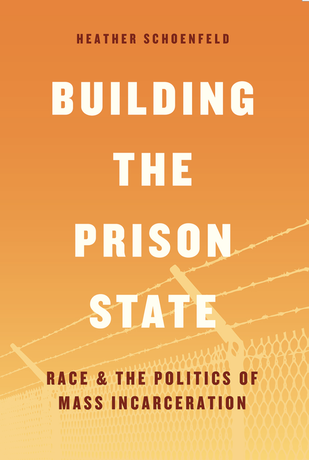*Winner* 2019 Award of Excellence, American Association for State and Local History
*Runner-up* 2019 Albert J. Reiss Distinguished Scholarly Publication Award, American Sociological Association
*Runner-up* 2019 Albert J. Reiss Distinguished Scholarly Publication Award, American Sociological Association
"Building the Prison State has earned itself a central place in the canon of literature on America’s peculiar incarceration binge." - American Journal of Sociology
"Both Building the Prison State and Misdemeanorland are extraordinary contributions to the scholarly canon and contemporary debates about carceral policy and criminal justice practice. They engage fully, and directly, with the salience of race, racial inequality, and racial conflict for understanding the historical, comparative, and contemporary significance of the criminal justice system in the United States." - Contemporary Sociology
"Schoenfeld’s fine-grained historical study provides fresh theoretical insights." - Theoretical Criminology
"Schoenfeld’s Building the Prison State offers a rich sociological and historical picture of the state of Florida’s inability to construct a healthy politics of criminal justice...Schoenfeld’s book traces a messy, highly contingent history where decisions often have unintended consequences that constrain the future pathways political actors can take." - Public Books
"Both Building the Prison State and Misdemeanorland are extraordinary contributions to the scholarly canon and contemporary debates about carceral policy and criminal justice practice. They engage fully, and directly, with the salience of race, racial inequality, and racial conflict for understanding the historical, comparative, and contemporary significance of the criminal justice system in the United States." - Contemporary Sociology
"Schoenfeld’s fine-grained historical study provides fresh theoretical insights." - Theoretical Criminology
"Schoenfeld’s Building the Prison State offers a rich sociological and historical picture of the state of Florida’s inability to construct a healthy politics of criminal justice...Schoenfeld’s book traces a messy, highly contingent history where decisions often have unintended consequences that constrain the future pathways political actors can take." - Public Books

The United States incarcerates more people per capita than any other industrialized nation in the world—about 1 in 100 adults, or more than 2 million people—while national spending on prisons has catapulted 400 percent. Given the vast racial disparities in incarceration, the prison system also reinforces race and class divisions. How and why did we become the world’s leading jailer? And what can we, as a society, do about it?
Reframing the story of mass incarceration, Heather Schoenfeld illustrates how the unfinished task of full equality for African Americans led to a series of policy choices that expanded the government’s power to punish, even as they were designed to protect individuals from arbitrary state violence. Examining civil rights protests, prison condition lawsuits, sentencing reforms, the War on Drugs, and the rise of conservative Tea Party politics, Schoenfeld explains why politicians veered from skepticism of prisons to an embrace of incarceration as the appropriate response to crime. To reduce the number of people behind bars, Schoenfeld argues that we must transform the political incentives for imprisonment and develop a new ideological basis for punishment.
Reframing the story of mass incarceration, Heather Schoenfeld illustrates how the unfinished task of full equality for African Americans led to a series of policy choices that expanded the government’s power to punish, even as they were designed to protect individuals from arbitrary state violence. Examining civil rights protests, prison condition lawsuits, sentencing reforms, the War on Drugs, and the rise of conservative Tea Party politics, Schoenfeld explains why politicians veered from skepticism of prisons to an embrace of incarceration as the appropriate response to crime. To reduce the number of people behind bars, Schoenfeld argues that we must transform the political incentives for imprisonment and develop a new ideological basis for punishment.
Additional Reviews
"Building the Prison State is sophisticated in its application of political theory and conceptualizations of racial projects; methodologically impressive...and consistent in its uncovering of the moving target of the nature of prisons and punishment in the Sunshine state." - Punishment & Society
“Schoenfeld’s meticulously researched Building the Prison State is a major contribution to our understanding of mass incarceration. Schoenfeld conveys the horrors of the US punishment system, while at the same time capturing the most basic fact that this horror—and the racism at its core—is routine. . .This is an indispensable book.” - Naomi Murakawa, author of The First Civil Right: How Liberals Built Prison America
“This is a must-read for anyone thinking deeply about the racial politics of criminal justice policy and potential solutions for prison reform.” - John Eason, author of Big House on the Prairie: Rise of the Rural Ghetto and Prison Proliferation
“Schoenfeld’s meticulously researched Building the Prison State is a major contribution to our understanding of mass incarceration. Schoenfeld conveys the horrors of the US punishment system, while at the same time capturing the most basic fact that this horror—and the racism at its core—is routine. . .This is an indispensable book.” - Naomi Murakawa, author of The First Civil Right: How Liberals Built Prison America
“This is a must-read for anyone thinking deeply about the racial politics of criminal justice policy and potential solutions for prison reform.” - John Eason, author of Big House on the Prairie: Rise of the Rural Ghetto and Prison Proliferation